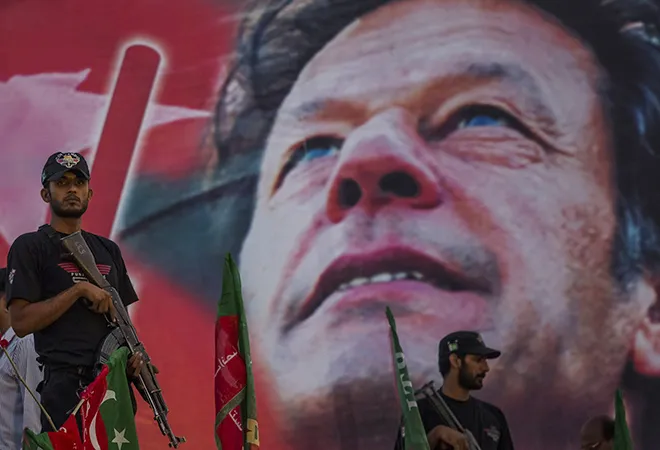
The votes are in and Prime Minister Imran Khan still enjoys the support of the nation, or maybe he doesn’t, maybe he never did. Either way it doesn’t matter, he is still king and the army remains kingmaker.
The elections for the Pakistani Senate concluded last week with the ruling Pakistan Tehreek-e-Insaaf (PTI) party winning 25 seats out of 100 in the upper house of parliament. Although the PTI bagged eighteen new seats, the defeat of PTI leader and serving finance minister, Hafiz Shaikh, from the Islamabad seat was a shocker, sending the nation into a tailspin questioning whether Khan truly had the support of his party or not, given that there must have been cross party voting in order for Shaikh to lose. Before the opposition parties, which are now united under the banner of the Pakistan Democratic Movement (PDM), could gather together and announce their next step, Khan called for a vote of confidence motion in the Senate, to reflect the support he had. On 6 March, Khan won the vote of confidence, which according to him meant squashing all doubts about his supremacy.
The votes are in and Prime Minister Imran Khan still enjoys the support of the nation, or maybe he doesn’t, maybe he never did.
Elections in the Senate happen every three years, where half the lawmakers are elected at one time, serving a period of six years. While allegations of horse trading and controversial statements are part and parcel of all elections, this year’s vote was particularly divisive given how outspoken and seemingly united the opposition parties have been regarding the PTI government and the military-intelligence establishment. The PDM, which comprises of ten major opposition parties, including Sharif’s PMLN, Zardari-Bhutto’s PPP and Maulana Fazlur Rehman’s Jamiat Ulema Isma (JUI) has, since late last year, been conducting regular rallies and protest marches across the country against Imran Khan and his election as Prime Minister. Their rally cry of “vote ko izzat do” (respect the vote) is directed at the military establishment and the fraudulent election they orchestrated that propped up Khan in 2018.
The coalition group, while being surprisingly vocal against the military’s interference in politics, has called out Army Chief General Qamar Bajwa and the Imran Khan government for its abysmal handing of the economy, inflation, treatment of minorities and loss of job opportunities. Usually, speaking up against the army is unthinkable as anyone who does is immediately labelled anti-Islam, anti-Pakistan, or an Indian and Israeli agent. What is unique about the PDM is that the group is headed by the firebrand cleric Rehman, known for his strong Islamist credentials, which makes accusing him of being anti-state all the more difficult. Motivated by his humiliating loss in the 2018 elections, Rehman has steadily been able to get the PMLN and PPP on his side as he battles for his political survival and relevancy.
Usually, speaking up against the army is unthinkable as anyone who does is immediately labelled anti-Islam, anti-Pakistan, or an Indian and Israeli agent.
The loss of PTI’s Islamabad seat, while not impacting the party’s majority, is a big deal for this very reason. It demonstrates that the PDM remains a strong threat, despite what the army says and wants the public to believe. As the results came in and the PTI realised they had lost the Islamabad seat, Khan unabashedly rushed to meet Army Chief General Qamar Bajwa and DG ISPR Lt Gen Faiz Hameed, removing any doubts (if there were ever any) as to whom he pays obedience to. As the PDM struggled to garner consensus on their next step, Khan made a quick rant on TV, blaming the Election Commission of supposed “foul play” and announcing that he would seek a vote of confidence in the Senate. His decision to call for the vote remains a legally dubious one, given that as per the constitution, only the president of the country can invoke Article 91(7), which requires the Prime Minister to obtain a vote of confidence. None the less, the idea was to the preempt any ‘vote of no-confidence’ that the opposition might ask for, further adding pressure to the Khan government.
The elections also further strengthen the opposition’s argument that the PTI is not the strong, united party it claims to be. While the vote between Gilani and Shaikh was a close one, the PTI leader’s defeat suggests that nine members of his party would have indulged in cross voting to make Gilani win. As an earlier member of the PPP who ironically served under Gilani in 2010, Shaikh had Imran Khan personally campaign for him, which makes his loss all the more bitter for the PTI chief, validating the idea that a vote against Shaikh is a direct vote against the PTI.
The elections also further strengthen the opposition’s argument that the PTI is not the strong, united party it claims to be.
While the elections may be over and the PDM may have won this battle, the war continues to be fought. In its attempt to level the playing field, the PDM is asking for transparency and accountability in politics, something that the military junta has never been directly questioned on. For the time being, however, it remains a marriage of convenience amongst parties that are usually at each other throats — united only by their disdain for Imran Khan and the way he came to power in 2018. It remains to be seen how long and how effectively the coalition can work together and whether they are strong enough to make any tangible gains. As for Imran Khan, who is good at blissfully ignoring the obvious, the writing on the wall is clear as day — he and the army are no longer untouchable.
The views expressed above belong to the author(s). ORF research and analyses now available on Telegram! Click here to access our curated content — blogs, longforms and interviews.




 PREV
PREV


